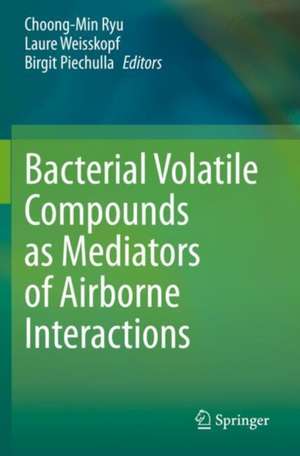Bacterial Volatile Compounds as Mediators of Airborne Interactions
Editat de Choong-Min Ryu, Laure Weisskopf, Birgit Piechullaen Limba Engleză Paperback – 27 aug 2021
This book covers the fundamentals of bacterial volatile-mediated communication with other organisms, starting with the biosyntheses of volatile organic compounds (VOC), interactions with plants and animals, interactions with microbes, tools for data analysis, and their applications. With this foundation in place, the book subsequently focuses on understanding the effect of bacterial volatiles on plant growth promotion, discusses plant immunity, and lastly shares insights into future research directions. The book is divided into fourteen-in-depth chapters, each of which is designed to enrich readers’ understanding of bacterial volatile compounds’ functions and various applications.
The pivotal roles of bacterial volatile compounds make this book essential reading for scientists and students of all biological disciplines seeking to fully understand microorganism responses and environmental adaptations. In addition to its value as a fundamental book for graduate students, it offers a clearly structured reference guide for all individuals working in microbiology.
| Toate formatele și edițiile | Preț | Express |
|---|---|---|
| Paperback (1) | 788.08 lei 38-44 zile | |
| Springer Nature Singapore – 27 aug 2021 | 788.08 lei 38-44 zile | |
| Hardback (1) | 800.34 lei 38-44 zile | |
| Springer Nature Singapore – 27 aug 2020 | 800.34 lei 38-44 zile |
Preț: 788.08 lei
Preț vechi: 1036.95 lei
-24% Nou
Puncte Express: 1182
Preț estimativ în valută:
150.82€ • 163.77$ • 126.69£
150.82€ • 163.77$ • 126.69£
Carte tipărită la comandă
Livrare economică 18-24 aprilie
Preluare comenzi: 021 569.72.76
Specificații
ISBN-13: 9789811572951
ISBN-10: 981157295X
Pagini: 336
Ilustrații: VIII, 336 p. 71 illus., 27 illus. in color.
Dimensiuni: 155 x 235 mm
Ediția:1st ed. 2020
Editura: Springer Nature Singapore
Colecția Springer
Locul publicării:Singapore, Singapore
ISBN-10: 981157295X
Pagini: 336
Ilustrații: VIII, 336 p. 71 illus., 27 illus. in color.
Dimensiuni: 155 x 235 mm
Ediția:1st ed. 2020
Editura: Springer Nature Singapore
Colecția Springer
Locul publicării:Singapore, Singapore
Cuprins
Preface.- Chapter 1: The domain of bacteria and their metabolic potentials.- Chapter 2: The domain of bacteria and their metabolic potentials.- Chapter 3: Structural diversity of bacterial volatiles.- Chapter 4: In vivo and in vitro volatile organic compound (VOCs) analyses in bacterial diagnostics: case studies in agriculture and human diseases.- Chapter 5: How plants might recognize bacterial volatiles.- Chapter 6: Contribution of bacterial biogenic volatiles to chemical ecology.- Chapter 7: Bacterial volatile-mediated plant abiotic stress resistance.- Chapter 8: Integration of bacterial volatile organic compounds with plant health.- Chapter 9: Volatile interplay between microbes – friends and foes.- Chapter 10: Role and function of bacterial volatiles in tritrophic interactions.- Chapter 11: Cyanobacterial VOCs as allelopathic tools.- Chapter 12: Collection, detection, identification and analysis of bacterial VOCs.- Chapter13: Using bacteria-derived Volatile Organic Compounds (VOCs) for industrial processes.- Chapter 14: Formulation and agricultural application of bacterial volatile compounds.
Notă biografică
Choong-Min Ryu
Korea Research Isntitute of Biosience and Biotechnology, Korea
Laure Weisskopf
University of Fribourg, Department of Biology, Switzerland
Birgit Piechulla
Universität Rostock, Institut für Biowissenschaften, Rostock, Germany
Universität Rostock, Institut für Biowissenschaften, Rostock, Germany
Textul de pe ultima copertă
This book covers the fundamentals of bacterial volatile-mediated communication with other organisms, starting with the biosyntheses of volatile organic compounds (VOC), interactions with plants and animals, interactions with microbes, tools for data analysis, and their applications. With this foundation in place, the book subsequently focuses on understanding the effect of bacterial volatiles on plant growth promotion, discusses plant immunity, and lastly shares insights into future research directions. The book is divided into fourteen-in-depth chapters, each of which is designed to enrich readers’ understanding of bacterial volatile compounds’ functions and various applications.
The pivotal roles of bacterial volatile compounds make this book essential reading for scientists and students of all biological disciplines seeking to fully understand microorganism responses and environmental adaptations. In addition to its value as a fundamental book for graduate students, it offers a clearly structured reference guide for all individuals working in microbiology.
Caracteristici
Enriches readers’ understanding of the roles of bacterial volatiles Offers straight forward information on the impact of bacterial volatiles in science Highlights the potential applications of bacterial volatiles in agriculture
